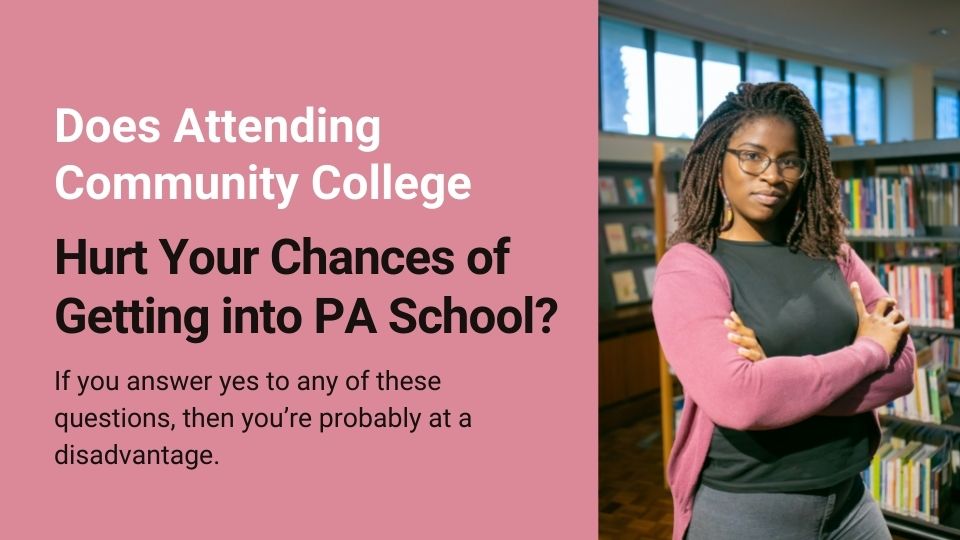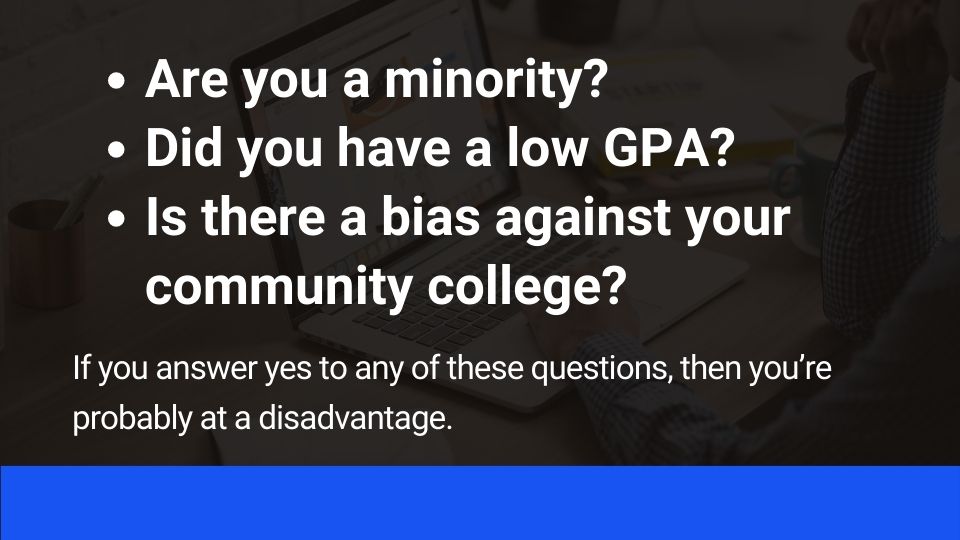
If you've got your heart set on becoming a physician assistant, then you're probably anxious to get started on the application process.
The only problem is that you've heard rumors that attending a community college can hurt your chances of getting into PA school. Does that mean you shouldn't even bother going to community college or taking community college courses to boost your application?
The answer isn't as simple as black and white. A lot of factors affect your chances of getting into PA school, and attending a community college is just one of them. But if you want to know whether or not going to community college can hurt your chances of getting into PA school, you've come to the right place.
In this blog post, we'll look at the research and see if we can figure out what it all means for you.
Does attending community college hurt your chances of getting into PA school?
To answer this question, we'll look at the research covered in this post by Harrison Reed, the acting Editor in Chief of the Journal of American Academy of Physician Assistants (JAAPA) and full-time faculty member at the George Washington University Physician Assistant program:
"Let's examine a study called “Does Community College Attendance Affect Matriculation to a Physician Assistant Program?” by Qian Luo, MPAS, Ph.D., and colleagues in Academic Medicine in November 2020.
They examined the community college attendance of 8,577 matriculants in the 2016-2017 CASPA application cycle.
More than 75% of matriculants attended community college *at some point*, either during high school (27%), prior to attending a 4-year university (13%), while attending a 4-year school (14%), or after attending a 4-year school (21%).
Students who attended community college either before or after 4-year university were more likely to be Black or Hispanic, come from an urban area, and have socioeconomic disadvantages than those who never attended community college. Those who attended community colleges also had lower GPAs on average.
To determine if the community college itself had an impact on acceptance, researchers controlled for a TON of variables like demographics, socioeconomic status, and academics.
Applicants who went to “community college-first” (before attending a 4-year university) had a 17% lower chance of getting into PA school compared to applicants who never attended CC.
The researchers suspect that BIAS in admissions is the main contributing factor to this decreased acceptance rate.
Interestingly, applicants who took community college courses after attaining a 4-year degree had a 13% *higher* chance of matriculating, though it’s not clear why. My speculation: they might end up having more life experience or being more well-rounded applicants.
Does this mean community college students are doomed? Hell no. The same study found that each additional school increases your chances by 9%, so this community college bias is equal to about two program applications.
Bias against community college students tracks with my experiences in PA education; basically, I have heard people say it. And it’s just one more factor hurting PA diversity of all kinds into PA school.
We do accept community college courses. Our requirement is that all prereq courses must have a letter grade on transcript. - Elissa Love, BCM PA Program in Houston
So does attending community college hurt your chances of getting into PA school? It depends.
- Are you a minority?
- Did you have a low GPA?
- Is there a bias against your community college?
If you answer yes to any of these questions, then you’re probably at a disadvantage.

However, if you’re prepared to deal with the bias, community colleges can be a cost-effective way to get your prerequisites done and end up with a more diverse application." - @harrisonreedpa
So is it OK to go to community college on your path to PA school?
I have spoken with PA school admissions staff who report zero preference as to where classes are taken so long as the credits are earned at an accredited college or university. According to most PA school ADCOMs, community college fits that definition. Rarely is it questioned during the application or the interview process.
However, there are PA programs that only accept prerequisite science courses from 4-year universities, and I have heard stories of prior applicants having community college coursework held against them.
As we see from this study, the standard is unreasonably higher for minority applicants and those from disadvantaged socioeconomic backgrounds. Your community college GPA does matter (i.e., getting a 4.23 GPA in community college will probably serve you better than a 2.83 at a 4-year university).
Taking community college coursework after obtaining your undergraduate degree does seem to help you. This is something I did. I attended community college the summer after getting my BS in biology at a 4-year university to obtain a certificate as an EMT. I also took additional night classes to boost my application.
One or two community college courses is fine. The only time it becomes a concern is if ALL of your science or prereqs come from a community college, or there are multiple community colleges you have attended. - A.T. Still University
Summary
So the take-home message here is that it behooves you to do your research early if you can. Suppose you are one of the lucky ones who know that you want to go to PA school, and you are a senior in high school, start calling potential PA programs early and making it a point to speak with the admissions team. Ask them this question directly to optimize your chances of success.
Verify that schools you want to apply to accept community college courses as prerequisites. If they don't and you did take your classes at a community college, then this school is not worth your time and money. It's their loss.
If you hold an undergraduate degree, consider taking CC courses after graduation to boost your application. There are tons of wonderful classes to choose from. You could retake classes that you underperformed in while in undergrad, or you can even obtain a certificate such as an EMT as I did.
Attending community college has many benefits. It can be an excellent way to save money on college credits while completing many of your required prerequisite coursework. With the cost of college tuition at 4-year universities now more than a home mortgage in many states (and financed at a higher rate), attending CC is a financially savvy move that will pay big dividends.
Community college classes are often smaller, and you may get more one-on-one attention. You can often save money on housing and get your PCE hours with a more flexible schedule. You may have a better chance of getting to know your professor, leading to excellent letters of recommendation.
In my opinion, PA programs that hold community college coursework against applicants need to check their bias at the door and realize that they are not only missing out on great applicants, but they are being prejudiced and limiting much-needed diversity in the PA profession. In the end, this hurts patients and nobody wins.
What are your thoughts? Did you take community college courses on your path to PA school? Do you think PA programs suffer from bias against CC graduates?
Bonus: Can you retake your prerequisites at community college? by Adanna The PA
Sources:
- https://pubmed.ncbi.nlm.nih.gov/33239534/
- Does attending community college hurt my chances by @harrisonreedpa
* The above article has been cited with the following terms: community college, community college attendance, community college attendance affect matriculation, community college affect matriculation, community college attendance, acceptance, community college attendance and matriculation.
Liked this post? Check out my other Pre-PA articles, our PA school applicant cheat sheet, and PA school application timeline. We also offer one-on-one Pre-PA consulting with experienced PAs who are CASPA applicant experts.
As always, if you have any questions or just want to shoot the breeze, feel free to email me at [email protected].














Leave a Reply